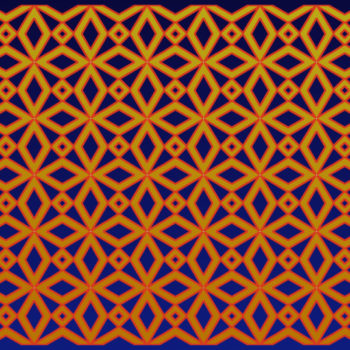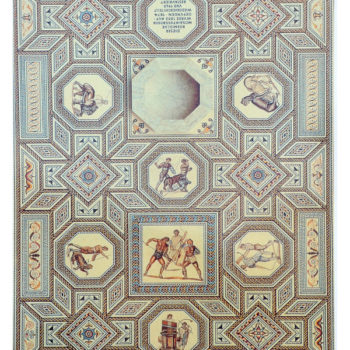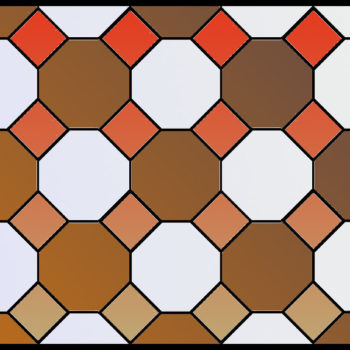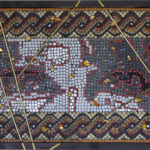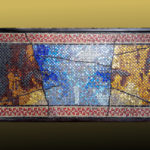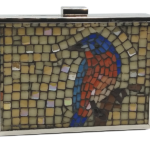Perfect mosaic borders ?
Careful observation of Roman mosaics, beyond obvious beauty and awesomeness, sometimes reveals imperfections in their realization. These defects mostly are of two kinds. They result either of poor design or of poor execution despite a good design.
In Roman and Byzantine times mosaics were realized by teams of craftsmen of various levels of skills. The Musivarius – Mosaic Master – would create a model and transfer it to the ground, low level slaves would break the stone and glass to create the tesserae, and workers would lay them on the floor.
Problems occur at different levels :
- Poor transfer of the model to the ground
- Non respect of the model by the workers
Being a man of multiple talents (I was told) and little resources (that I know) I design and execute my own mosaics and so do my best to avoid this kind of imperfections, because you know, it will be difficult to blame them on someone else…
In 2016 I started to incorporate borders in my own mosaics. I often use geometric patterns inspired by the Roman mosaics I document in my travels.
Geometric patterns are interesting for 3 reasons :
- They contrast strongly with the figurative center of the mosaic, therefore help the viewer focus on the main theme.
- They can be very intricate and beautiful of themselves.
- They are usually realized by repetition of elemental patterns.
Because these geometric borders are designed by repetition of simple elements, they can be laid by craftsmen of lesser ability than central pieces which have to be laid by very skilled craftsmen or masters. When it comes to my work, an other reason I love this repetitivity is that it allows me to design perfect mosaic borders on computer.
A common problem
One common problem you‘ll have to solve is the case when the length of the border does not correspond to the length of your mosaic. If your elementary pattern is 3 inches long and your mosaic is 13 inches long, you can’t fit an exact number of elements in the length of your mosaic.
One simple mosaic border I have documented and recreated on computer is a simple triangle border :
You can see problems encountered in realization of this type of mosaics in this piece from the 2nd century Mosaic of the Birds from Italica in Spain :
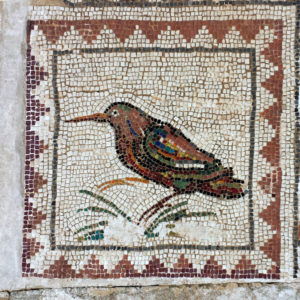
In the upper left corner the upward line obviously did not meet with the upper border.
Similar problem occurred in 3rd century Germany :
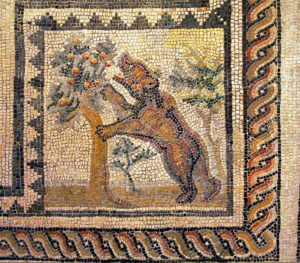
Here again, in the upper left corner, the horizontal and vertical borders do not meet properly
This sort of mistakes could have been prevented by properly designing the whole thing.
Knowing that you have to use an exact number of elements on the vertical and horizontal parts of the border, you can adjust the dimensions of the central piece by adding margins to it or slightly changing its design
I recreated a border around the emblema,
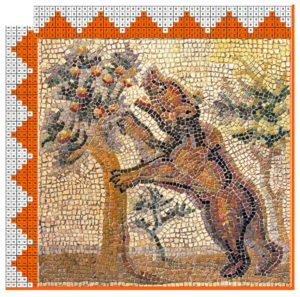
I drew my borders to perfectly fit the dimensions of the emblema. Because the emblema is not tall enough, the vertical border is too long and the 2 borders do not meet properly in the upper corner.
The problem can easily be solved by adding an additional (Brownish) border 1 tessera wide around the emblema, which allows to center it inside a well proportioned border.
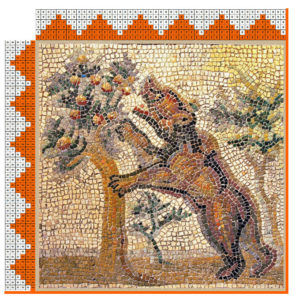
Being very meticulous in the design of my mosaics does not prevents me from improvising. In my Carole’s eyes series, I use a same carefully designed model to create many different variations. The point of a meticulous design before you go to actually lay your tesserae is that you know everything is going to fit properly and the aesthetic of your work won’t be ruined by something that could have been easily avoided through proper planning.
Geometric borders add depth and intensity to a mosaic. I have created a few models available for free to use on your own mosaics, or other graphic project, but you will need a little planning in order to fit them well around your center piece.
You can download a model for this triangles border here :

Adjusting the dimensions of the emblema to fit inside your border will allow for a perfect fit. There are however, other ways to tweak your design to make adjust your border to your center piece. I will cover some of these in a next post.


